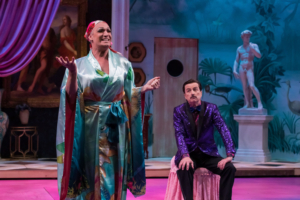Review: LA CAGE AUX FOLLES at Geva Theatre Center

Tragedy honors the nobility of the human spirit through selfless dedication, but comedy inspires us to live our lives in joyous celebration. Geva's inaugural production of the 2019-2020 season, LA CAGE AUX FOLLES, brims with this comic (as the French would say) "joie de vivre." Adam Koch's stunning set design transports the audience to St. Tropez, the beach resort hot spot in the south of France made famous in the 1950s by the traipsing of bikini clad starlets such as Brigette Bardot and amplified in the 1960s by the introduction of the provocative topless monokini. It is a world created for sunny relaxation and vibrant, unrestrained entertainment. It is a haven for artists, fashionistas and free spirits. Created from a conservative fishing village, St. Tropez has become an international oasis for carefree fun and excess. Koch's airbrushed warm colors and soft curved lines juxtapose nicely with the vibrant lights strung throughout the design. It captures both the relaxed beachfront streets where by day patrons sit at outdoor cafes drinking in the panoply of humanity and at night experience the pulsing drive of wild passions.
Within this world reside Georges and Albin, a happy, loving couple whose lives are interrupted by the announcement of their son's wedding to Anne Dindon, the daughter of an infamous, moralizing, conservative politician. Amplifying the dramatic tension is the fact that Georges runs a provocative drag nightclub and Albin is the star performer. Fearing that his parents' gay lifestyle will appall his future in-laws, their son Jean-Michel entreats Georges to erase all traces of their flamboyance, hide Albin, and invite his absentee birth mother to dinner with his fiancé's family. In denying the truth and donning the charade of heterosexual normalcy, Jean-Michel ignites anger, hurt feelings and comic chaos.
Central to the conflict is the complex character of Albin. Danny Vaccaro plays Albin as both a sensitive and loving mother and an ostentatious sequin-loving diva named Zaza with high-strung aplomb. Much of the comedy of the play generates from his fits of histrionics. Vaccaro exudes gentle warmth and impassioned fire. His fragility elicits from the audience both pity and laughter. In the tradition of HELLO DOLLY and MAME where the leading lady is the heartbeat of the show, Vaccaro's Albin is the emotional nexus of this production. Though a flitting butterfly of emotion, it is Albin who acts as a stable nucleus, a stalwart of love, firmly holding everyone true to the values of family, friends and genuine morality.
While Georges seems stable and strong, he is the one who caves to convention and denies his beloved in order to please his son. Mark Cuddy, as Georges, demonstrates precision and panache in his portrayal. He displays comic flair with well-timed quips. His interpretation may have soared even higher if infused with more warmth, intimacy and spontaneity. The same can be said for Michael Evan Williams' rendering of son, Jean-Michel. His relationships with his father and Albin are clear but come off a bit removed. However, Danny Vaccaro brings genuine feeling and depth to each relationship even as he paints Albin with broad, campy brushstrokes.
In contrast to Georges and Abin's love and commitment, the Dindons claim morality and traditional family values but clearly lack warm, loving relationships. Edouard Dindon blinded by money and status, berates and belittles his wife and can't understand why his daughter would stay with Jean-Michel after he refuses to give her a dowry. James Michael Riley as M. Dindon is commanding and dominant. However, his portrayal ventures too far into silly stereotype and diminishes the overbearing threat his character must present. Susan Haefner as Mme. Dindon is appropriately mousey and comically cowed, longing to burst forth into the liberating world of La Cage Aux Folles. Paige Silvester as Anne conveys sweetness and innocence with an undertone of subtle strength that ignores and resists her father. All in all, the acting is clear and professional but at times slips into caricature that runs counter to Vaccaro's honesty and depth.
However, the real co-star of the show is the club La Cage Aux Folles itself. The Cagelles, the chorus of drag performers, infuse the production with glitz, glamour and pizzazz. Everyone of the Cagelles create a unique character. They perform the spectacular choreography of Sam Hay flawlessly and stylishly. Kevin Copenhaver costumes them in a sparkling combination of bugle beads, glitter, feathers and leathers. The culminating effect imbues the world of La Cage Aux Folles with an infectious joy and exuberance.
The musical numbers range from the energetic production numbers at the club to intimate and personal explorations of self. This contrasting experience is movingly illustrated by hearing the lively opening number "We Are What We Are" juxtaposed against Albin's intimate and powerful singing of the reprise "I Am What I Am". These numbers illustrate thematically that to live authentically in the world one must stay true to oneself and not be fettered by the constraints of society.
Geva's LA CAGE AUX FOLLES is sassy with unapologetic glitz. It pulses with exuberance, glamour and unrestrained fun. It is an anthem to tolerance and love. Fittingly, as we were sitting in the lobby watching the audience walk by peppered with individuals decked out in glittering drag attire, one older gentleman commented on the strangeness of the more flamboyant dress. A young woman near him spontaneously replied, "Isn't it great. Everyone gets to be themselves."
LA CAGE AUX FOLLES runs until October 6th. For more information and tickets click here.
Comments
Videos

